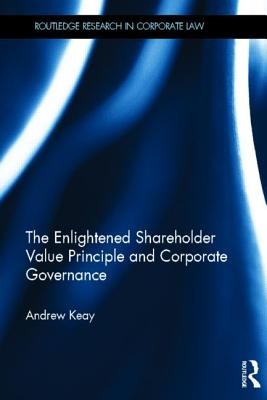
- We will send in 10–14 business days.
- Author: Andrew Keay
- Publisher: Routledge
- ISBN-10: 041568434X
- ISBN-13: 9780415684347
- Format: 15.6 x 23.4 x 1.9 cm, kieti viršeliai
- Language: English
- SAVE -10% with code: EXTRA
The Enlightened Shareholder Value Principle and Corporate Governance (e-book) (used book) | bookbook.eu
Reviews
Description
The enlightened shareholder value principle (ESV) was formulated during the comprehensive review of UK company law by the Company Law Steering Group in the late 1990s and early 2000's and requires directors of companies to act in the collective best interests of shareholders. The principle was taken up by the then UK Government and is now embedded in the Companies Act 2006. The emergence of the principle constitutes an important development in corporate governance, particularly in determining what directors must consider when managing the affairs of their companies.
This book explains and analyzes the nature of ESV and its contribution to corporate governance whilst also examining where it fits into the existing theoretical landscape. Andrew Keay traces the development of the principle of ESV and considers it in the context of the existing principles which have historically influenced corporate governance. In doing so, the book draws on several empirical studies thereby enabling us to gauge how the ESV principle is addressed in commercial practice. Keay goes on to compare ESV with the constituency statutes that apply in the US in order to determine whether anything can be learnt from the American experience. The book also assesses the reaction of other jurisdictions to the advent of ESV and considers what impact ESV will have on financial institutions and non-financial institutions in the aftermath of the global financial crisis.
EXTRA 10 % discount with code: EXTRA
The promotion ends in 22d.13:51:33
The discount code is valid when purchasing from 10 €. Discounts do not stack.
- Author: Andrew Keay
- Publisher: Routledge
- ISBN-10: 041568434X
- ISBN-13: 9780415684347
- Format: 15.6 x 23.4 x 1.9 cm, kieti viršeliai
- Language: English English
The enlightened shareholder value principle (ESV) was formulated during the comprehensive review of UK company law by the Company Law Steering Group in the late 1990s and early 2000's and requires directors of companies to act in the collective best interests of shareholders. The principle was taken up by the then UK Government and is now embedded in the Companies Act 2006. The emergence of the principle constitutes an important development in corporate governance, particularly in determining what directors must consider when managing the affairs of their companies.
This book explains and analyzes the nature of ESV and its contribution to corporate governance whilst also examining where it fits into the existing theoretical landscape. Andrew Keay traces the development of the principle of ESV and considers it in the context of the existing principles which have historically influenced corporate governance. In doing so, the book draws on several empirical studies thereby enabling us to gauge how the ESV principle is addressed in commercial practice. Keay goes on to compare ESV with the constituency statutes that apply in the US in order to determine whether anything can be learnt from the American experience. The book also assesses the reaction of other jurisdictions to the advent of ESV and considers what impact ESV will have on financial institutions and non-financial institutions in the aftermath of the global financial crisis.


Reviews